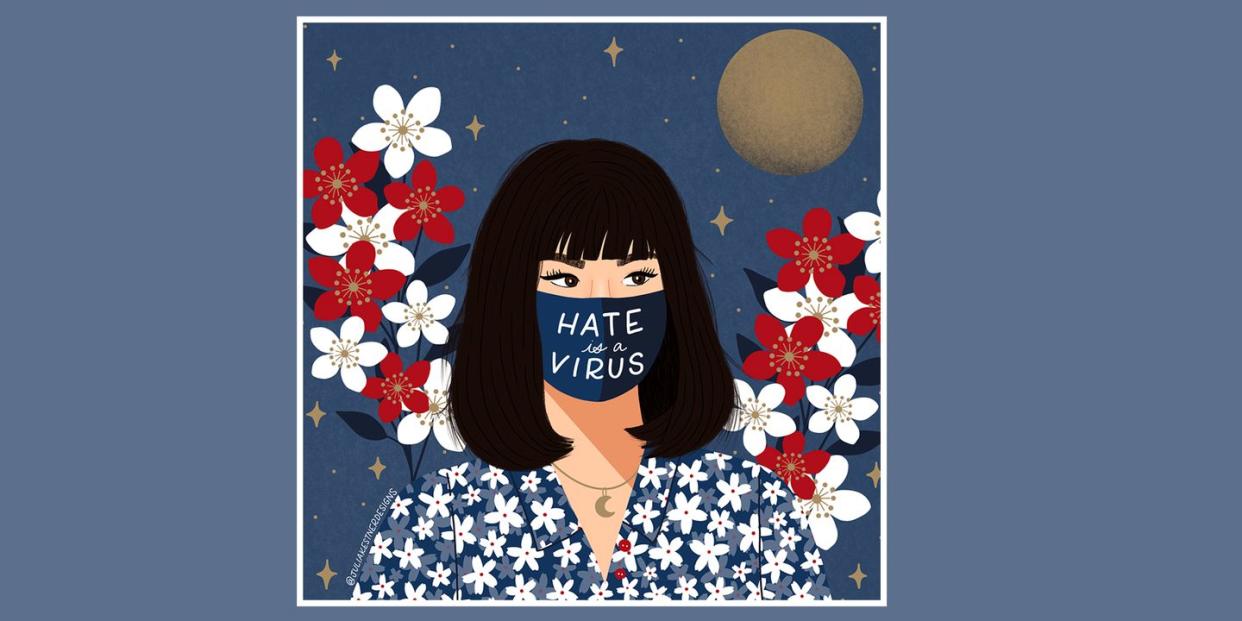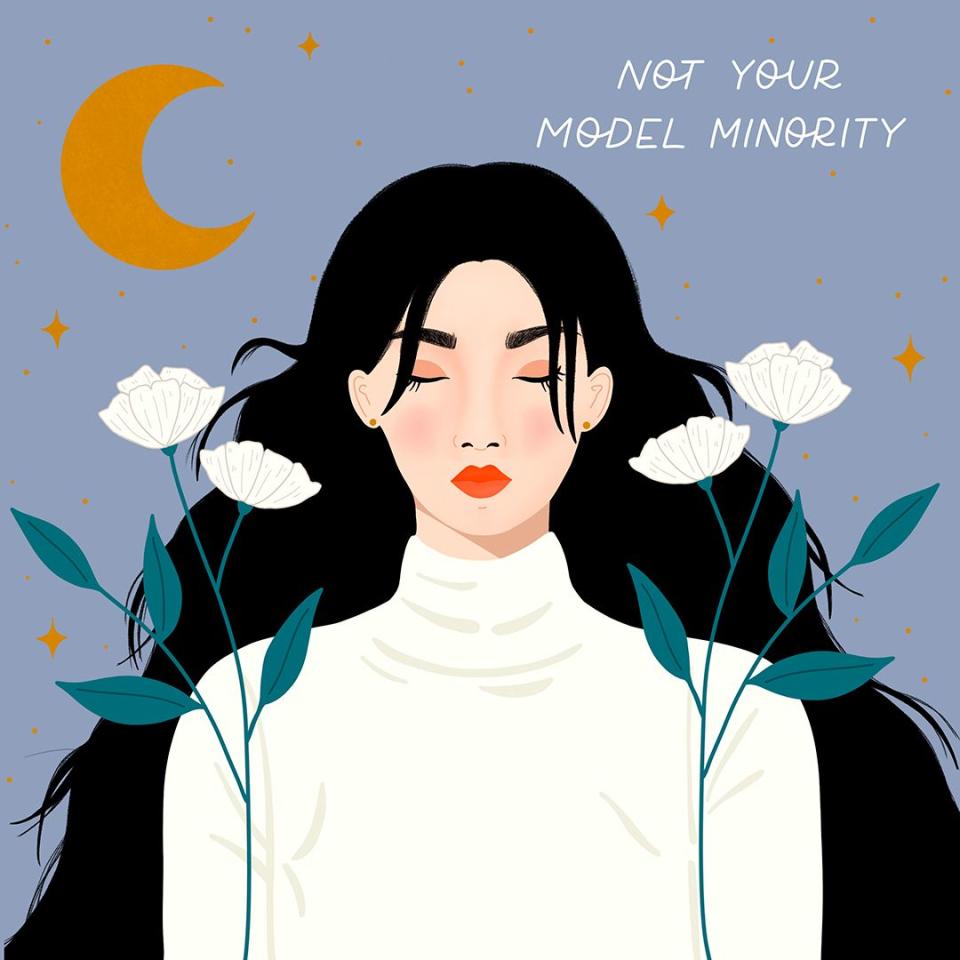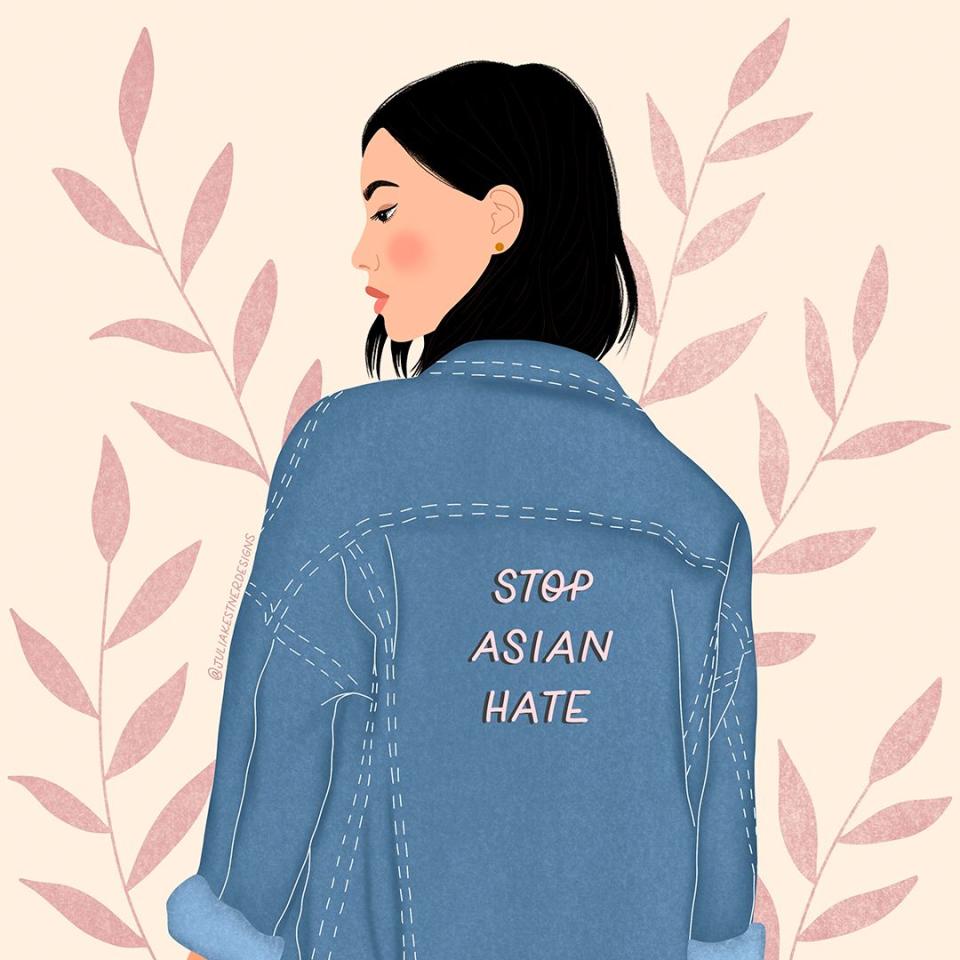Why Some Asian Americans Are Staying Silent About the Ongoing Hate Crimes

I'm Filipino American, and last week, I dreamt about a group of young men punching my boyfriend Kristian (also Filipino American), in the face, just seconds before circling around my Filipino mother and stabbing her. Phone in hand, I was ready to call for help — but my hands were stuck, my eyes fixated on my mom, my ears throbbing from the yelling and screaming. I stood frozen, just watching. That's when I woke up shivering, in a helpless panic. Fortunately, that was just a bad dream. But the hateful discrimination that's been happening in the Asian American and Pacific Islander (AAPI) community in the past few weeks is far from fantasy: It’s been a living nightmare.
In New York, a Chinese woman got her head shoved into a newsstand box while waiting in line outside a bakery. Just a few days prior, two elderly Asian women were struck in the head on the subway in two separate attacks happening within hours of each other. On the West coast, an 83-year-old Filipino woman was randomly punched on a San Diego trolley, and in the same week, another Asian elderly man was pushed while walking in San Francisco, his hip broken in the assault. And probably the saddest of all, a California Navy veteran died after a policeman knelt on his chest during a mental health crisis.
So many devastating hate crimes are happening in such a short amount of time, but almost no one is talking about them. Sure, a handful of Asian American influencers are starting to speak up, and I see some Asian friends sprinkling related posts in between funny memes and cheese board photos. But off screen, we have little to say to each other regarding the situation, our fear, or our frustrations. Maybe we’ll mention how horrible the situation is and sigh for a moment, but the topic quickly changes back to our favorite shows, the books we’re reading, or the road trip we plan to take once the weather gets nicer.
I couldn’t wrap my head around the silence. Yes, this is a sensitive issue and it's heartbreaking to talk about, but I was starting to feel incredibly lonely, not knowing where or how to share my feelings. I wondered why we have a hard time discussing this terrifying time with each other and why some friends haven’t posted anything about the hate crimes at all. When we were so quick to speak up about the Black Lives Matter movement, the silence felt deafening.

The community has endured a long history of discrimination.
Let me be clear: the discrimination that the Black community has been facing has its own excruciatingly painful history, and I don't want to take away from that. We can’t deny that Asian Americans face discrimination on a different scale from our Black brothers and sisters. That’s unfortunately left us labeled as the “model minority," or the perceived "more successful" minority group, which is just another way to downplay the racism that the AAPI community has faced.
But no one talks about our identity as the “perpetual foreigner,” a stereotype that says Asian Americans are foreign and don’t belong in the United States. And no matter how hard Asians work, we still lag behind our white counterparts. In 2019, for example, the average AAPI woman was paid 8% less in hourly wages than the average non-Hispanic white man, according to Economics Policy Institute.
None of this is new. Asian Americans have faced discrimination since at least the 1800s, when Chinese laborers were brought to the U.S. as cheap labor. The term "yellow peril" was coined because white laborers feared the newcomers would take over the workforce and compromise their own livelihood. This sentiment led to the passage of the Chinese Exclusion Act of 1882, the first law to limit immigration based on race. That law restricted citizenship to Chinese resident aliens, enacted unfair taxation on Chinese-owned businesses, and encouraged resentment towards Asians, much of which persists today.
The latest wave of hate crimes is reminiscent of this history of discrimination in the AAPI community and just serves to compound the trauma so many of us have experienced our entire lives. The same goes for any other BIPOC and minority community that experiences racial discrimination.
Lots of us grew up staying quiet.
Maybe we don’t speak up because as children of immigrants, many of us were taught to keep our opinions and feelings to ourselves in a nation where everyone else speaks their mind. "Work hard," my dad would tell me and my two sisters in elementary school. "Don't complain about things that aren't worth complaining about," my mom chimed in. This was the way to success and achieving the American dream. We were lucky to be in the states, away from poverty and corruption in our motherland overseas.
It’s hard to talk about the pain, the fear, the discomfort, and the confusion we're all feeling. Asian families typically don’t talk about their emotions at home, because their parents don’t teach them how. But Asian Americans have always been a subject of ridicule. A lot of Asian kids, whether they’re immigrants, children of immigrants, adoptees, or partially Asian, can recall at least one instance in their lives when another kid pulled their eyes back at them accompanied with a sing-songy “Ching-Chong” jeer.
I was born and raised in New Jersey, but I have always been that one brown girl with black hair in a sea of white, blue-eyed classmates and colleagues. I'll always remember the girl who constantly told me my Filipino lunch "stunk up the place," how older white men have told me I have an "exotic look," or the countless times someone's asked me if I'm Chinese or Japanese. I felt embarrassed about my parents’ cooking that I adored and instead, asked for money to buy lunch at school. To this day, I’m still confused about whether or not I should thank those men for calling me “exotic,” since they say it in such a polite tone. And I actually feel like I have the wrong answer when people ask me I’m this heritage or that, because the truth is probably something they’re not familiar with. Frankly, it was much easier to quietly laugh along with the comments than to say anything at all.

A lack of unity makes some feel 'not Asian enough.'
Perhaps some Asian Americans also stay mum because they feel that the fight isn't theirs. Non-Asians might not know this, but there has always been a very real divide between East Asians and South Asians. The former, or people of Chinese, Taiwanese, Japanese, Korean, and Mongolian descent, has been historically associated with higher education and upper social classes. South Asians are often stereotyped as coming from countries that aren't fully developed, our skin browned from working in the sun to make a living.
Colorism very much exists in Asia too. If you look at Asian media, you’ll still come across advertisements endorsing whitening soaps and creams. Similar to how many Black Americans correlate darker skin with lower socioeconomic status and a lower likelihood to hold elected office, South Asians, or people with Indian, Filipino, Bangladesh, Sri Lankan, and Pakistani backgrounds, perceive darker Asian skin as less beautiful and of a lower class.
Decades of this divide has left many Asian Americans questioning whether they’re Asian enough. We can blame American culture, as we tend to associate Asian food with Hibachi and lo mein, or Asian style with kimonos. We often forget the “brown Asian” experience, leaving Indians and Filipinos out of the conversation entirely.
So maybe some Asians are discouraged by the lack of unity within the Asian community, or perhaps some think only Chinese elders are facing backlash, especially after White House officials referred to COVID-19 as the “Chinese virus” or “Kung-Flu.” But if we look at the cultural identities of the victims being attacked in the past few weeks, a majority of them were actually South Asian people who’ve been told, “[The pandemic] is all your fault because you’re Chinese.”

Let's all speak out against racism.
Here’s the thing: it isn’t the AAPI community’s responsibility to speak up about what’s happening. Right now, many Asian people are constantly worried about protecting their elders — and themselves — from getting punched on the way to work or having their livelihoods compromised by having to close up shop due to prejudice.
And that's why it’s absolutely crucial for everyone to elevate these stories that are happening now, regardless of our cultural identity. Most of the people who actually speak up about the topic are Asian, and so we're left with a constant echo chamber that bounces our voices back to other Asians. Sure, President Joe Biden has finally addressed the racism and xenophobia, but meaningful action has been slow. Some state prosecutors have failed to address these cases as hate crimes, and in some cases, defendants are being released without bail. This is why we all have to remember that this isn't an Asian fight. This is a human fight.
We need to let our AAPI community know that their fear, trauma, and voices are valid. One of the ways to do that is to stand up as a vocal supporter, or ally. Here's how to show allyship:
Check on your Asian friends, colleagues, and neighbors. It's a sensitive topic, so it might be difficult to find the right words. A simple, “Hey, I heard about the recent hate crimes. I just want to let you know I'm here for you," is better than nothing at all.
Start the conversation with your non-Asian friends and family. Awareness is key. Ask your parents if they've heard about the most recent wave of anti-Asian hate crimes, or bring it up in conversation with friends.
Speak up when you hear microaggressions. Some examples include asking an Asian person where they're from or complimenting them on their "perfect English accent." This insinuates that they don't belong. Using words like "oriental" or "exotic" to describe someone or something Asian is outdated, inappropriate, and downright offensive. And as for saying that all Asians look alike, I don't think I need to explain this one! If you ever witness these or related incidents in public or at the workplace, speak up for that person. Strength comes in numbers.
For more resources, Visit StopAsianHate.Org. This is an excellent place to learn more about the racial injustices against Asians, report hate crimes, and find non-profit organizations to support the cause.
You Might Also Like

